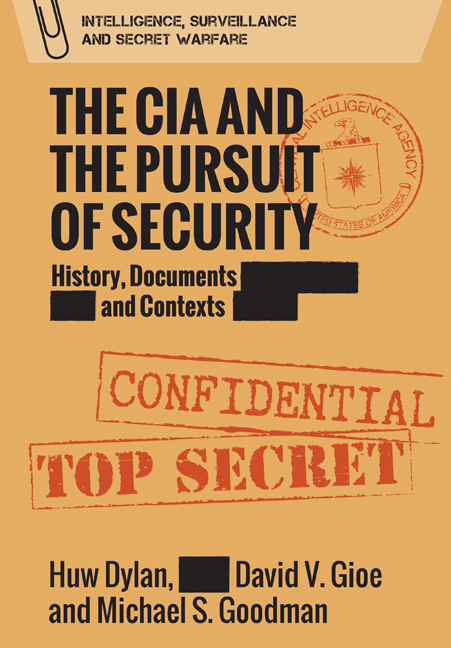Book contents
- Frontmatter
- Contents
- List of Documents
- Foreword
- Acknowledgements
- Introduction
- 1 Intelligence for an American Century: Creating the CIA
- 2 The Development of CIA Covert Action
- 3 A ‘Gangster Act’: The Berlin Tunnel
- 4 The CIA and the USSR: The Challenge of Understanding the Soviet Threat
- 5 Anglo-American Intelligence Liaison and the Outbreak of the Korean War
- 6 The CIA and the Bomber and Missile Gap
- 7 The CIA and Cuba: The Bay of Pigs and the Cuban Missile Crisis
- 8 The CIA in Vietnam
- 9 The CIA and Arms Control
- 10 The CIA’s Counter-Intelligence Conundrum: The Case of Yuri Nosenko
- 11 1975: The Year of the ‘Intelligence Wars’
- 12 Watching Khomeini
- 13 The CIA and the Soviet Invasion of Afghanistan
- 14 Martial Law in Poland
- 15 Able Archer and the NATO War Scare
- 16 The Soviet Leadership and Kremlinology in the 1980s
- 17 The CIA and the (First) Persian Gulf War
- 18 A Mole in Their Midst: The CIA and Aldrich Ames
- 19 ‘The System was Blinking Red’: The Peace Dividend and the Road to 9/11
- 20 Reckoning and Redemption: The 9/11 Commission, the Director of National Intelligence and the CIA at War
- 21 The ‘Slam Dunk’: The CIA and the Invasion of Iraq
- 22 The Terrorist Hunters Become Political Quarry: The CIA and Rendition, Detention and Interrogation
- 23 Innovation at the CIA: From Sputnik to Silicon Valley and Venona to Vault 7
- 24 Entering the Electoral Fray: The CIA and Russian Meddling in the 2016 Election
- 25 Flying Blind? The CIA and the Trump Administration
- Bibliography
- Index
8 - The CIA in Vietnam
Published online by Cambridge University Press: 24 September 2020
- Frontmatter
- Contents
- List of Documents
- Foreword
- Acknowledgements
- Introduction
- 1 Intelligence for an American Century: Creating the CIA
- 2 The Development of CIA Covert Action
- 3 A ‘Gangster Act’: The Berlin Tunnel
- 4 The CIA and the USSR: The Challenge of Understanding the Soviet Threat
- 5 Anglo-American Intelligence Liaison and the Outbreak of the Korean War
- 6 The CIA and the Bomber and Missile Gap
- 7 The CIA and Cuba: The Bay of Pigs and the Cuban Missile Crisis
- 8 The CIA in Vietnam
- 9 The CIA and Arms Control
- 10 The CIA’s Counter-Intelligence Conundrum: The Case of Yuri Nosenko
- 11 1975: The Year of the ‘Intelligence Wars’
- 12 Watching Khomeini
- 13 The CIA and the Soviet Invasion of Afghanistan
- 14 Martial Law in Poland
- 15 Able Archer and the NATO War Scare
- 16 The Soviet Leadership and Kremlinology in the 1980s
- 17 The CIA and the (First) Persian Gulf War
- 18 A Mole in Their Midst: The CIA and Aldrich Ames
- 19 ‘The System was Blinking Red’: The Peace Dividend and the Road to 9/11
- 20 Reckoning and Redemption: The 9/11 Commission, the Director of National Intelligence and the CIA at War
- 21 The ‘Slam Dunk’: The CIA and the Invasion of Iraq
- 22 The Terrorist Hunters Become Political Quarry: The CIA and Rendition, Detention and Interrogation
- 23 Innovation at the CIA: From Sputnik to Silicon Valley and Venona to Vault 7
- 24 Entering the Electoral Fray: The CIA and Russian Meddling in the 2016 Election
- 25 Flying Blind? The CIA and the Trump Administration
- Bibliography
- Index
Summary
The long war in Vietnam left an indelible mark on the fabric of innumerable elements of American life. It shaped elements of America's military and political debates for decades following the end of the war. Its divisiveness and polarising impact generated a profound cultural shift in some quarters, which subsequently bled over into literature, film and, more generally, the contested nature of the national memory. The nature of the fighting, and the general character of the war, was a harbinger for the types of challenges that would come to dominate America's wars in the late twentieth and early twenty-first centuries: asymmetric, both conventional and ‘among the people’, and to a greater or lesser extent, reliant upon good intelligence for their effective prosecution. Just as with more contemporary wars, the intelligence war in Vietnam has generated several narrative strands that dominate the popular imagination: paramilitarism and violence, controversy and politicisation, and accusations of profound failure. Some of these narratives withstand historical scrutiny, others do not. But the scope of the intelligence war in Vietnam is both broader and deeper than credited in the popular imagination.
The historiography of US intelligence, and the CIA in particular, in Vietnam and South East Asia more broadly is well developed, and has continued to grow over recent years. Elements of it have been immortalised in fiction, most notably from the early days of US involvement in Indochina in Graham Greene's The Quiet American, published in 1955. And the intelligence element has, of course, been a staple feature of general histories of the war for decades owing, in no small part, to the very public controversies that surrounded it. More recent histories have benefited from greater perspective – for example, from the memoirs of key CIA individuals – and from access to declassified materials that have been published by the US government. These include John Prados’ study of the war, published in 2009, which offers an illuminating perspective on the CIA's evolving role in the conflict. These general histories of the war have also been supplemented with volumes focused on the CIA and its work more specifically; some, such as Tim Weiner's Legacy of Ashes, offer a very critical perspective.
- Type
- Chapter
- Information
- The CIA and the Pursuit of SecurityHistory, Documents and Contexts, pp. 127 - 155Publisher: Edinburgh University PressPrint publication year: 2020



